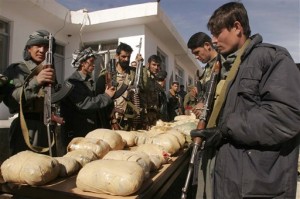When Will Washington Learn? Alternative Drug Policies Needed to Prevent Violence
“These violent delights have violent ends
and in their triumph die, like fire and powder
which, as they kiss, consume.”
– William Shakespeare, Romeo and Juliet

Distressingly, the United States has long ignored its role in the illegal drug trade and its contribution to the ongoing violence plaguing the territory throughout Mexico and Colombia. Recently, however, counteractive efforts have begun to assume an inclination toward violence as a strategy to curtail the further proliferation of drug trafficking and illegal immigration from Colombia and Mexico. Similarly, Mexican President Felipe Calderón’s strategy of rooting out drug cartels with widespread flame and combat has only aggravated the problem. Over the course of a four-year initiative, over forty thousand Mexicans have been killed, the overwhelming majority of whom had no connection to drug cartels. New York Times columnist Damien Cave’s article on the hacker syndicate Anonymous retells how after the Zetas drug cartel kidnapped an Anonymous employee, the syndicate released a haunting video (much like those filmed and used for intimidation by the Zetas), threatening to release hundreds of names of political officials tied to the cartel, intending to foment violence against those individuals. This poses a terrifying situation: responding to the violence in Mexico and Colombia with further unchecked, unplanned violence.
These sorts of tactics, along with policy suggestions of U.S.-sponsored military action in Mexico, are a step in a decisively wrong direction. If the costly, detailed anti-drug campaigns were not capable of preventing the further diffusion of illegal drugs and migrants into the U.S., it is foolish to think that an all-out drug war could ever be effective in resolving the issue. Past administrations have often marginalized the problems associated with the drug trade, insisting that developing solutions should not be the responsibility of the U.S. government, but rather should remain an initiative solely under Colombian or Mexican control.
However, the U.S. bears more responsibility than its leadership would care to admit. Weapons traded and used by cartels and criminals in both countries have been largely traced back to the U.S, drastically increasing the immediacy of violence. The largest major market for drugs lies in the continental U.S., where suburban dwellers anticipating weekend bashes casually purchase illicit substances connected to thousands of deaths in Mexico and Colombia.
It is time for Washington to switch its focus to addressing the question of drug decriminalization, involving a panorama of debates and dialogue that feature urgent position papers and compelling discussions on various components. The initiative would feature hugely popular byproducts: saving billions of dollars spent on law enforcement and rehabilitation, decreasing violence in the U.S. itself that would otherwise come from the intra-national drug market, and initiating a global realization that preemptive violence will produce solely “violent ends.” If the U.S. does not act now, the bloodshed in Monterrey will soon be mirrored in Los Angeles or in New York City. It is clear that wherever drugs go, violence is soon to follow, illustrating that it is imperative for future policies to cut off the problem at the source, eliminating the drug trade through the back door by way of decriminalization.

